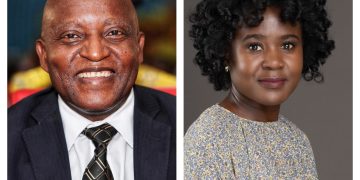
Namibia and the European Union on Thursday marked 35 years of formal diplomatic and economic cooperation, with both parties reaffirming commitments to trade, development finance, and green industrialisation.
At the Europe Day celebration in Windhoek, Deputy Minister of International Relations and Trade, Jenelly Matundu, described the EU as a consistent and trusted partner since Namibia’s independence.
“This cordial relationship has been maintained since 1990, and the EU has become a major trading partner for Namibia,” she said.
Matundu highlighted EU financial support across multiple sectors, including infrastructure, education, and clean energy. Key funding has come through the European Development Fund (EDF).
She noted several flagship projects, including N$320 million for early childhood development and N$45 million for Windhoek’s Waste Buy-Back Centre.
“The EU has supported Namibia’s development goals through strategic partnerships that contribute to poverty reduction and sustainable growth,” said Matundu.
The Deputy Minister also acknowledged the EU’s role in Namibia’s port infrastructure development and green hydrogen ambitions, including support for the recently inaugurated HyIron Oshivela plant in Arandis.
She welcomed the EU’s backing of Namibia’s Vision 2030 and applauded its alignment with the country’s green recovery strategy.
Similarly, EU Ambassador Ana Beatriz Martins emphasized the economic strength of the partnership, noting that Namibia currently runs a trade surplus with the EU.
She credited the SADC-EU Economic Partnership Agreement, now in its tenth year, for providing Namibia duty- and quota-free access to the EU single market.
“The EU is Namibia’s largest export market and most diverse trading partner. We view this success as shared prosperity,” said Martins.
Martins also underscored the EU’s commitment to Namibia’s green transition, referencing the HyIron plant, developed using German technology, which is the world’s first to produce iron using only renewable energy.
She said at least six additional projects are being assessed, with potential to bring N$408 billion in investment to Namibia’s green hydrogen sector.
“This partnership is already yielding tangible benefits and positioning Namibia as a global player in decarbonisation,” said Martins.
Beyond trade and energy, the EU plans to roll out a technical vocational education programme focused on green industry skills. Martins said the EU is also supporting governance reforms, particularly in anti-corruption and financial oversight.
She affirmed the EU’s support for Namibia’s leadership in women’s empowerment, referencing the upcoming 25th anniversary of UN Resolution 1325 and Namibia’s hosting of a side event in New York.
“Our cooperation on gender equality, peace and security continues to be a key pillar of our partnership,” she said.
Both sides are expected to reinforce their commitments at the 3rd African Union–European Union Ministerial Meeting in Brussels on 21 May, where economic transformation and development financing will be central themes.
“We look forward to further elevating AU–EU cooperation and strengthening Namibia’s role within it,” said Martins.













